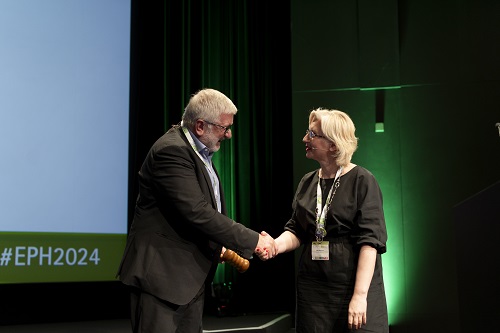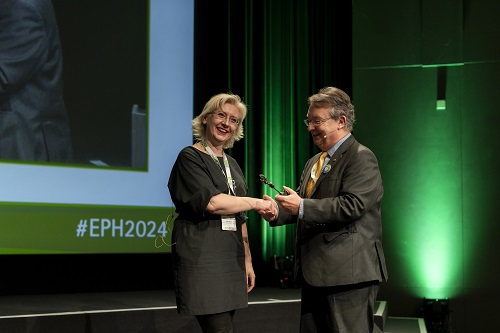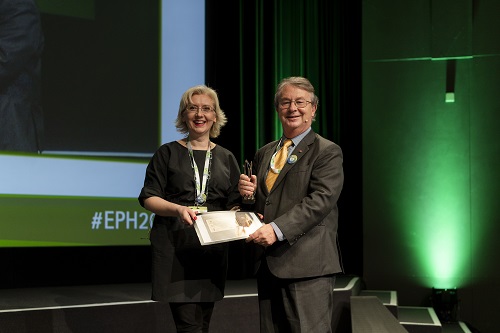 |
The European Public Health Association Newsletter - November 2024 |
|
Newsletter - November 2024 |
1. EditorialReflections from Lisbon – A Note from the New EUPHA PresidentHaving recently returned from the 17th European Public Health Conference in Lisbon, I am filled with gratitude and inspiration from this extraordinary gathering of the public health community across Europe and beyond. Key highlights include:
Special thanks to the EUPHA team, led by Charlotte Marchandise, and supported by Floris Barnhoorn, Jessica van Diemen-Vlijm, Lydia Rink-Zoer, Robert Klarecki, José Velthuis, Nicholas Bishop, Natalie de Boer, Sarah Abitbol, and Julian Hein, who ensured seamless execution. As we reflect on the impactful discussions and collaborations in Lisbon, we now turn our attention to Helsinki 2025, where we will continue advancing public health with our Finnish partners. I look forward to seeing many of you there—or even sooner! Warm regards, |
2. EUPHA updateEUPHA President changesEUPHA is proud to announce Tit Albreht as the new EUPHA President, officially installed during the Closing Ceremony of the European Public Health Conference in Lisbon. We extend our warmest congratulations to Tit as he embarks on this important role, and we look forward to his leadership in advancing public health across Europe.
We also take this moment to express our heartfelt gratitude to Iveta Nagyova, our now Past-President, for her unwavering dedication, strategic vision, and tireless work over the past years. Her contributions have been instrumental in shaping EUPHA’s priorities and influence in the global public health arena. We are pleased Iveta will be staying onboard as the Chair of EPH Conference.
Additionally, a special acknowledgment goes to Martin McKee, EUPHA Past-President, for his years of leadership and his continued guidance as a Special Advisor to EUPHA. Martin’s wisdom and expertise remain invaluable as we navigate the challenges and opportunities ahead. With this leadership, EUPHA is well-positioned to continue its mission of fostering collaboration, innovation, and impactful action for better public health in Europe.
Urgent Public Health Call: EUPHA's Statement on the Gaza ConflictEUPHA has issued a strong statement addressing the devastating public health implications of the ongoing Gaza conflict. Recognizing the escalating humanitarian crisis, we urge immediate action to protect civilians and safeguard public health infrastructure in the region. The statement highlights two critical priorities:
This call to action emphasizes the need for collaboration among governments, international organizations, and public health professionals to address the crisis effectively. Together, we must prioritize equitable access to care, ensuring no one is left behind. EUPHA sections Statement for Inclusive and Equitable Climate Action: Building a Sustainable Future for AllWe recognize that climate action is essential for building a healthier, more sustainable future for all inhabitants of our planet. The involvement of women, minority communities, the disprivileged, disempowered, and vulnerable people is critical in achieving equity and sustainability in climate actions. Their participation is vital for fostering the behavioral and mindset changes necessary for enduring progress. New EUPHA section presidentsRecently elections were organised for new section presidents. Law and public health Past Steering Committee members Migrant and ethnic minority health Past Steering Committee members Public health epidemiology Urban public health Past Steering Committee members We sincerely thank all past Presidents, Vice Presidents and steering committee members for their time and dedication to EUPHA and EUPHA looks forward to working with all new Presidents and their teams. |
3. European Public Health Conference18th EPH Conference, Helsinki, Finland
The 18th EPH Conference will be held in Helsinki, Finland, from 11 – 14 November 2025. Pre-conferences will be held on Tuesday 11 November. The main conference is from 12 – 14 November. Theme of the EPH conference 2024 is: Investing for sustainable health and well-being. The conference will be held at the renovated Finlandia Hall. Read more here. Abstract submission Helsinki 2025Abstract submission for the 18th EPH Conference is open from 1 February until 1 May 2025. Abstracts are invited for workshops, oral, pitch and poster presentations. Do not miss the opportunity to share your work with colleagues at the largest public health event in Europe. In collaboration with EUPHAnxt we provide an abstract tutoring programme offering an opportunity for young and/or less experienced abstract submitters to receive feedback from experienced reviewers. Check our website for any updates. 17th EPH Conference Lisbon 2024
Recordings of all plenary sessions are available on the EPH Conference YouTube and LinkedIn channels. Find out more here. |
5. Call for proposals, job opportunitiesOpportunity to join JA PreventNCD Youth Advisory Group [Europe]JA PreventNCD is currently recruiting members for our Youth Advisory Group, a platform that will play a key role in guiding our initiatives, providing feedback on program development and policy efforts, and help us amplify the voices of young people fighting against the burden of cancer and other non-communicable diseases through prevention and health promotion. We are looking for motivated individuals between the ages of 18 and 35 from the European region who are eager to contribute their ideas and perspectives. THCS Call "Better care closer to home: Enhancing primary and community care"THCS will launch its third Joint Transnational Call for proposals aiming to fund research and innovation projects that strengthen primary and community health and care systems and provide policy and decision makers with the necessary knowledge and tools to govern the transitions needed in the primary and community care sector. Senior Public Health Expert at National Health Observatory in LuxembourgThe National Health Observatory in Luxembourg is looking for a French speaking Senior Public Health Expert. Find more information here. EuroHealthNet is looking for Senior Research CoordinatorWe are hiring a Senior Research Coordinator to contribute to impactful research with an international and interdisciplinary team, addressing inequalities in health services access and outcomes. You will join CHAIN’s Brussels hub at EuroHealthNet, working on cancer-related data collection in vulnerable populations. Two paid internship positions - on Advocacy and Strategic Communications - with the International Planned Parenthood Federation European Network (IPPF EN)IPPF EN occasionally offers short-term internships. Applications are particularly encouraged from candidates openly living with HIV. IPPF is committed to equal opportunities and cultural diversity. PhD fellowship in Climate Change Adaptation in Conflict Settings at the University of Copenhagen Department of Public HealthThis position will be based at the Global Health section at the Department of Public Health with the disaster research group and will be part of the Copenhagen Centre for Disaster Research. The section is interdisciplinary, collaborative and brings together decades of Global South experience working with various topics of global health and disasters. Rehabilitation in healthcare coordinator, National Consultant (WHO/EURO; Kyiv)The role of the successful candidate is to lead the rehabilitation support unit (RSU) to the implementation and monitoring of the new national rehabilitation road map for rehabilitation in healthcare. This includes managing a technical team to address all areas of the road map and ensure timely and effective support is provided to the MoH, NHSU, oblast and community level health authorities, civil society, and international stakeholders. The road map will address the WHO six building blocks of health systems strengthening: governance, medical products, information management, service delivery, financing, and workforce. Digital (EU4Health): Call for proposals on advancing the adoption of artificial intelligence in healthCheck out the call here. Call for papers! Do you research quality of care or patient safety in low-resource settings? If so, consider this call for an upcoming special issue for Frontiers in Health Services on "Patient SafeUnsafe care results in over 3 million deaths each year globally. It is estimated that over half of these deaths are preventable. The majority of harm occurs in resource-constrained contexts, where systemic factors relating to context, complexity of care, organisational behaviour, human factors, wider socio-political influences impacting both health-seeking behaviours of patients and governance and regulation of health systems, together with significant workforce shortages, contribute to an increased risk of adverse events. |
6. Interesting newsCOP29 outcome: EU upbeat on finance, disappointed on climate action (Euractiv)After the COP29 global climate talks in Azerbaijan concluded at 3am local time on Sunday (24 November), the EU welcomed a deal to triple global climate finance until 2035 to $300 billion but criticised the lack of agreement on concrete climate action. Statement on the Passing of Hon. Faustine Ndugulile (UNITE)It is with deep sorrow and profound respect that we at the UNITE Parliamentarians Network for Global Health acknowledge the passing of Hon. Faustine Ndugulile, UNITE member, member of parliament in Tanzania, former Deputy Minister of Health, Community Development, Gender, Elders, and Children of Tanzania, and recently elected WHO Direct-Elect for Africa. EU disease agency considers quitting Elon Musk's X over disinfo (Politico)The spread of scientific misinformation on the social media platform is making the ECDC think twice, its director says. COP29: The Health Expenses of Climate Change (Think Global Health)Does a failure to focus on health economic losses stand opposed to stronger action at the UN summit and beyond? |
7. Upcoming courses and conferences
|
8. Interesting publicationsDealing with a healthcare crisis, lessons from Ukraine (Euractiv)To build health resilience in times of conflict, countries need to have robust supply chains of medicines, expand telemedicine and decentralise power generation to support health facilities and make clean water, said Ihor Kuzin, Ukraine’s Deputy Minister of Health. Health, the missing chapter in the Draghi Report on Europe's futureBy Martin McKee, Anniek de Ruijter and Tamara Hervey (The Lancet Regional Health Europe) State of Health in the EU Cycle - Health at a Glance: Europe 2024 report has been publishedRead the article here. Open access book "Managing Infodemics in the 21st Century: Addressing New Public Health Challenges in the Information Ecosystem"This is now available in NCBI Bookshelf. Editors: Tina D. Purnat, Tim Nguyen, and Sylvie Briand. European Health Forum Gastein 2024 Outcomes Report is out!Read more here. Systems Change Isn't One Thing. Financing Should Reflect ThatFrom experimentation to redesign to optimization, the interconnected processes by which systems are changed require distinct forms of funding. (SSRI) Sandro Galea's The Healthiest Goldfish delivers another great reflection pieceTwo pieces, in fact. This time on “Certainty as the great enemy of tolerance” Second Report by LSC DiPH Sheds Light on Digital Health Trends in GermanyThe Leibniz ScienceCampus Digital Public Health (LSC DiPH) has released its second comprehensive study on digital health technology use in Germany. The research, led by Dr. Karina Karolina De Santis, which surveyed 1,020 individuals, focuses on the adoption rates of health-related apps and digital tools, emphasizing the importance of digital literacy in the effective use of these technologies. (LSC DiPH and SAGE) |
9. European Institutions’ newsEuropean Commission
The European Parliament confirmed the new College of Commissioners, starting December 1. Notable figures include:
Várhelyi’s controversial remarks on women's rights and abortion prompted MEPs to reassign sexual and reproductive health responsibilities to Lahbib, now overseeing Equality. This emphasizes subsidiarity in health matters (TFEU Article 168(7)). Further Reading: Explore EUROCARE’s presentation here. European ParliamentThe SANT Subcommittee will transition into a full committee, taking on public health, mental health, and pharmaceutical policy, underscoring health’s increasing EU priority. Council: Trending Topics: National Level:
For more, see our Public Consultation Guideline here Among the confirmed European Commissioners who will be particularly important to EU citizens impacted by rare diseases
New EU Commission to Unveil Healthcare Cybersecurity Plan in First 100 DaysEnsuring the European healthcare sector is well-equipped to respond to cyber-attacks will be a top priority for the newly elected European Commission. Commission receives scientific advice on One Health approach in the EUThe European Commission has today formally received the evidence review report and opinion of the Scientific Advice Mechanism (SAM) on One Health governance in the EU. The opinion sets out a series of policy recommendations on how the One Health approach could be managed and governed in the EU. Commission and OECD report shows need to further promote healthy ageing while tackling health workforce shortagesthe Commission and the Organisation for Economic Cooperation and Development (OECD) published the Health at a Glance: Europe 2024 report. This year's edition highlights the importance of lifelong health promotion and disease prevention to boosting healthy ageing. It also stresses the urgent need to address health workforce shortages across Europe. Webinar "Health at a Glance: Europe 2024"This #EUHPP Live webinar on “Health at a Glance: Europe 2024 Promoting healthy ageing and longevity whilst tackling health workforce shortages ! took place online on Monday 18 November 2024. Upcoming events from the Observatory on health systems and policiesLeveraging evidence for health systems transformation: Passing the baton at the Observatory - Special Symposium, 10 December 2024 Past events, recordings, news
The Technical Support Instrument project “EU Health Resource Hub for Sustainable Investing in Health” wrapped up in Vienna, with highlights here |
10. European Centre for Disease Prevention and Control newsEurosurveillance - Volume 29, Issue 44, 31 October 2024Rapid communication Surveillance Research Eurosurveillance - Volume 29, Issue 45, 07 November 2024Editorial Rapid communication Outbreaks Research Perspective Eurosurveillance - Volume 29, Issue 46, 14 November 2024Rapid communication Surveillance Research Eurosurveillance - Volume 29, Issue 47, 21 November 2024Editorial Rapid communication Surveillance Research Perspective Eurosurveillance - Volume 29, Issue 48, 28 November 2024Editorial Rapid communication Outbreaks Research |
11. WHO newsResource guide for the implementation of the Roadmap on antimicrobial resistance for the WHO European Region 2023-2030WHO/Europe has launched a new resource guide for the implementation of the AMR roadmap for the WHO European Region. This interactive guide provides the relevant information and tools that can help Member States tailor interventions to their specific context and priorities. Regional Committee session draws to a close in Copenhagen with look ahead to the second European Programme of WorkThe 74th WHO Regional Committee for Europe (RC74) drew to a close on 31 October 2024 following a 3-day agenda covering a wide range of discussions and decisions on health and governance topics. Partnering with the European Union (EU) to tackle mental health challengesWHO is partnering with the European Commission to protect and promote the mental health of more than 450 million people living in the EU, Iceland and Norway by improving country capacities to take a comprehensive approach to mental health. 1000 days of war in Ukraine: resilience in health response, recovery and reform efforts despite attacks and ongoing challenges19 November 2024, marked 1000 days since the Russian Federation’s full-scale invasion of Ukraine. The toll on the health of the Ukrainian population and its health-care system has been immense. The war has escalated health needs, especially in areas such as mental health, trauma care and noncommunicable diseases (NCDs), affecting millions who face continuous attacks, trauma and restricted access to health care due to ongoing hostilities and financial barriers. Ukrainian citizens are bearing increased physical and psychological strain, heightening the need for accessible care across all health services. Social participation is key to health system governanceWHO/Europe has launched two new policy briefs showcasing country case studies, documenting policy lessons from across our Region.
WHO/Europe launches a new toolkit to help countries to transform long-term care systemsIn a major step towards enhancing the quality and accessibility of long-term care (LTC) across Europe, the WHO Regional Office for Europe has launched its new State of Long-term Care Toolkit. This practical, innovative resource aims to support policy-makers at regional, national and local level in reshaping LTC systems to be more responsive, inclusive and sustainable. |
|
|
|
Unsubscribe If you would like unsubscribe from the EUPHA newsletter then please click here. |






